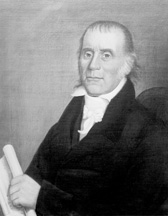Andrew Gregg was an early landowner in Penns Valley who became an important politician, representing the middle portion of the state in the U.S. House of Representatives and Pennsylvania as a United States senator. The Greggs became one of the leading families of early Centre County, noted for their accomplishments in government, business, and military service.

Andrew Gregg was of Scots-Irish descent. His great-grandfather David Gregg moved from Scotland to Northern Ireland, where his family became merchant traders in Londonderry. Several members of Andrew’s father’s generation relocated to America in the 1730s, including his father, who eventually settled in western Lancaster County, and then moved to a farm near Carlisle, Pennsylvania in 1750. Andrew was born there on June 10, 1755.
He received a classical education in a Latin school in Carlisle and at an academy in Newark, Delaware just before the Revolutionary War. As the British advanced on Philadelphia in August of 1777, Gregg briefly served with a Delaware militia unit. While his other brothers remained in the army, he returned to Carlisle to assist his father on the farm.
In 1779, he went to Philadelphia, where he spent four years as a tutor at the College of Philadelphia (now University of Pennsylvania). In 1783, he returned to Middleton, Cumberland County, and became a merchant, remaining there four years.
He married Martha, the daughter of Gen. James Potter in 1787, and moved to Lewistown, then being laid out by Potter. Two years later, he took up a tract of land in Penns Valley, in what was then Northumberland County, today Centre County.
In 1791, Gregg was elected one of the eight Pennsylvania representatives to the Second Congress of the United States. The elected representatives were not yet organized into parties, but he was considered a member of the anti-administration faction, which was later recognized as the Democratic-Republican Party, in opposition to the Federalists. Gregg served in the House of Representatives until 1807, and then was elected as a U.S. senator for Pennsylvania serving from 1807 to 1813, including a brief time as president pro tempore of the Senate.
Gregg was a Jeffersonian Republican, like most of the voters in his region, but he was not aligned with the most radical members of his party. Fundamental questions of taxation and the Whiskey Rebellion, representation and elections, the rights of property-holders, the power of the judiciary, and war with Britain were among many issues that vexed Congress in Gregg’s time under America’s first four presidents.
After retiring from the Senate, he moved from Penns Valley to Bellefonte, where he became the first president of Centre Bank in 1813. He was not finished with politics, however. In December 1820, Governor Joseph Hiester, who had served with Gregg in Congress, appointed him Secretary of the Commonwealth. In 1823, Gregg was persuaded to run for governor against John Andrew Shulze, a Jeffersonian Democrat of the “New School,” almost twenty years Gregg’s junior. Defeated decisively, Gregg retired from politics.
He and his wife, Martha Potter, had ten children, among whom were Jane, the wife of Roland Curtin and mother of Pennsylvania Gov. Andrew Gregg Curtin; Julia Ann, the wife of Gen. James Irvin; Andrew Gregg, Jr., soldier, state senator, and father of Civil War Gen. John Irvin Gregg; and Matthew D., the father of Civil War Gen. David McMurtrie Gregg.
Andrew Gregg continued his business interests and died, aged 79, in Bellefonte, May 20, 1835. He is buried in Union Cemetery. Gregg Township in Centre County and Union County are named for him.
Lee Stout
Sources:
“Gregg, Andrew, 1755-1835”. Biographical Dictionary of the United States Congress. https://bioguide.congress.gov/search/bio/G000442 (Accessed June 28, 2024).
Houpt, David W. “Contested Election Laws: Representation, Elections, and Party Building in Pennsylvania, 1788-1794.” Pennsylvania History, vol. 79, No. 3 (Summer, 2012), pp. 257-283.
Jordan, John Woolf, ed. Colonial and Revolutionary Families of Pennsylvania: Genealogical and Personal Memoirs. New York: Lewis Historical Pub. Co., 1911.
Linn, John Blair. History of Centre and Clinton Counties, Pennsylvania. Philadelphia: Louis H. Evarts, 1883.
Shankman, Andrew. “Malcontents and Tertium Quid’s: The Battle to Define Democracy in Jeffersonian Philadelphia.” Journal of the Early Republic, Vol. 19, No. 1 (Spring, 1999), pp. 43-72.
First Published: August 31, 2024
Last Modified: February 19, 2025
